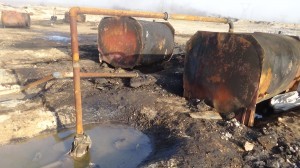Coalition Airstrikes Lead to Fuel Shortage in eastern Syria

Oil and gas infrastructure has been shut down following September bombings, pushing up prices.
Ahmad al-Bouleily*
(Deir al-Zor, Syria) – Last month’s airstrikes by international coalition forces on oil and gas production sites under the control of Islamic State in Iraq and Syria (ISIS) have resulted in higher fuel prices in parts of eastern Syria.

The strikes have disrupted production at several makeshift oil refineries in the region of Deir al-Zor, prompting fears of a fuel shortage at the onset of winter.
Deir al-Zor, an ISIS stronghold, was hit by airstrikes that began at dawn on September 23.
By targeting the region’s energy infrastructure United States-led forces are attempting to cut off a key revenue source for ISIS. According to the international research consultancy, IHS, the group were producing two million US dollars’ worth of crude oil per day before the strikes.
Deir al-Zor is Syria’s main oil producing region and all its oil fields are under ISIS control. While the September strikes have pushed prices up locally, fuel prices across Syria have been on the rise since August. Poor electricity infrastructure and a failure to maintain supply, particularly in opposition-held areas, has increased reliance on diesel generators, pushing up demand for fuel. The Syrian regime has also increased the price of heating oil by a third from this month.
The coalition airstrikes targeted oil fields, informal refineries and the Koniko gas plant. The Al-Omar oil field, 15 kilometres east of the town of Al-Bsayra, normally produces 32,000 barrels per day. The al-Tanak oil field, also targeted by the strikes, produces 27,000 barrels per day.
Until recently, local oil trader Abou Hassan, bought crude oil from wells and sold it on at local refineries.
He would pay between 6,000 and 8,000 Syrian pounds for one barrel and he would sell it on at a mark-up of around 12 per cent. However, he is afraid to continue working since the Al-Omar field was targeted by airstrikes last month.
“When the coalition planes bombed the oil field, I was only 500 metres away,” Abou Hassan told Damascus Bureau. “I was there to buy crude oil, but after that I decided to leave the oil trade for now.”
“We are afraid of the bombing so we have to sacrifice people’s needs.”
Mohammad Mhaysen tells a similar story. He has stopped working at an informal refinery in Boqros in the eastern suburbs of Deir al-Zor. Oil production at many such facilities has stopped in fear of further strikes.
This has pushed up prices for local consumers.
“As a result of the halt in oil production, demand has increased and fuel derivatives have become scarce,” Mohammad said. “So we end up paying the bill for the war on [ISIS].”
Ordinary Syrians are already feeling the price rise. In some places the price of gas and crude oil has doubled. The cost of a barrel of diesel has also increased from 9,000 to 15,000 pounds.
Hana Moussa looks after a family of six and is struggling to cope.
“Every day I look for gas so we can cook, but it is very difficult to find,” she told Damascus Bureau. “If we do, it is insufficient and very expensive. A litre of gas used to be 45 Syrian pounds, but now it’s 100.”
As winter approaches the price rise will be felt worst by the thousands of people who have been uprooted by the conflict and forced to live in tents and other temporary accommodation.
Abou Hamza, who delivers humanitarian aid in the village of al-Bouleil, said the problem could have disastrous consequences over the winter.
“In light of these deteriorating conditions, whether the loss of fuel, the impossibility of procuring it due to air raids, or the lack of clothes and blankets, the displaced are going to face a catastrophic situation,” he said. “We expect many people will die because of the cold.”
Analysts share his concerns.
Badeeh Mohammad is a member of the London-based Syrian Observatory for Human Rights that monitors the conflict through local networks.
“The coalition forces shelled the primitive oil refineries that are owned by individuals working to provide an essential product in people’s everyday lives,” he said.
“Of course targeting the oil fields is going to have negative repercussions for ordinary citizens.”
*Ahmad al-Bouleily is the pseudonym of a reporter in Syria.
